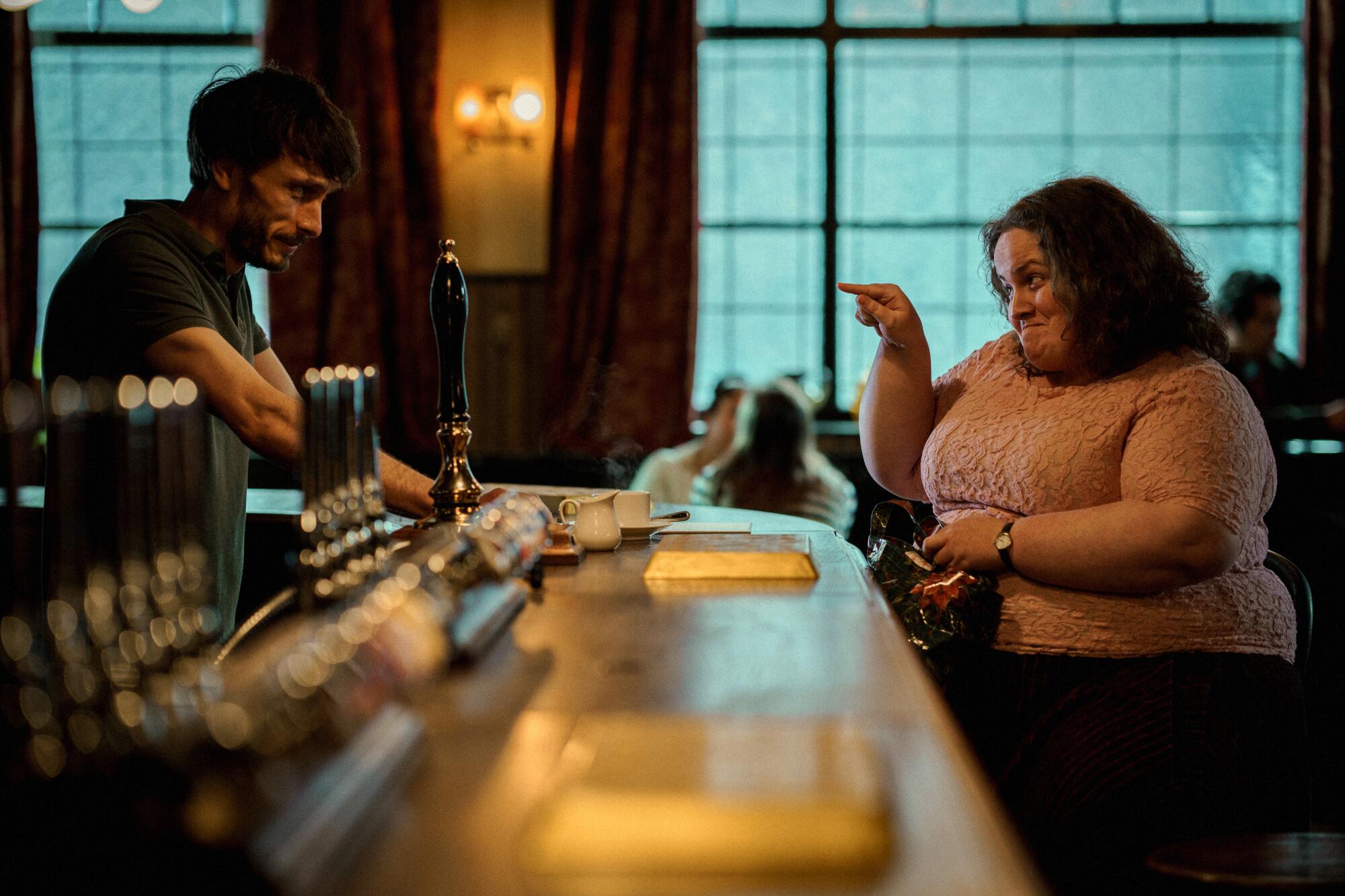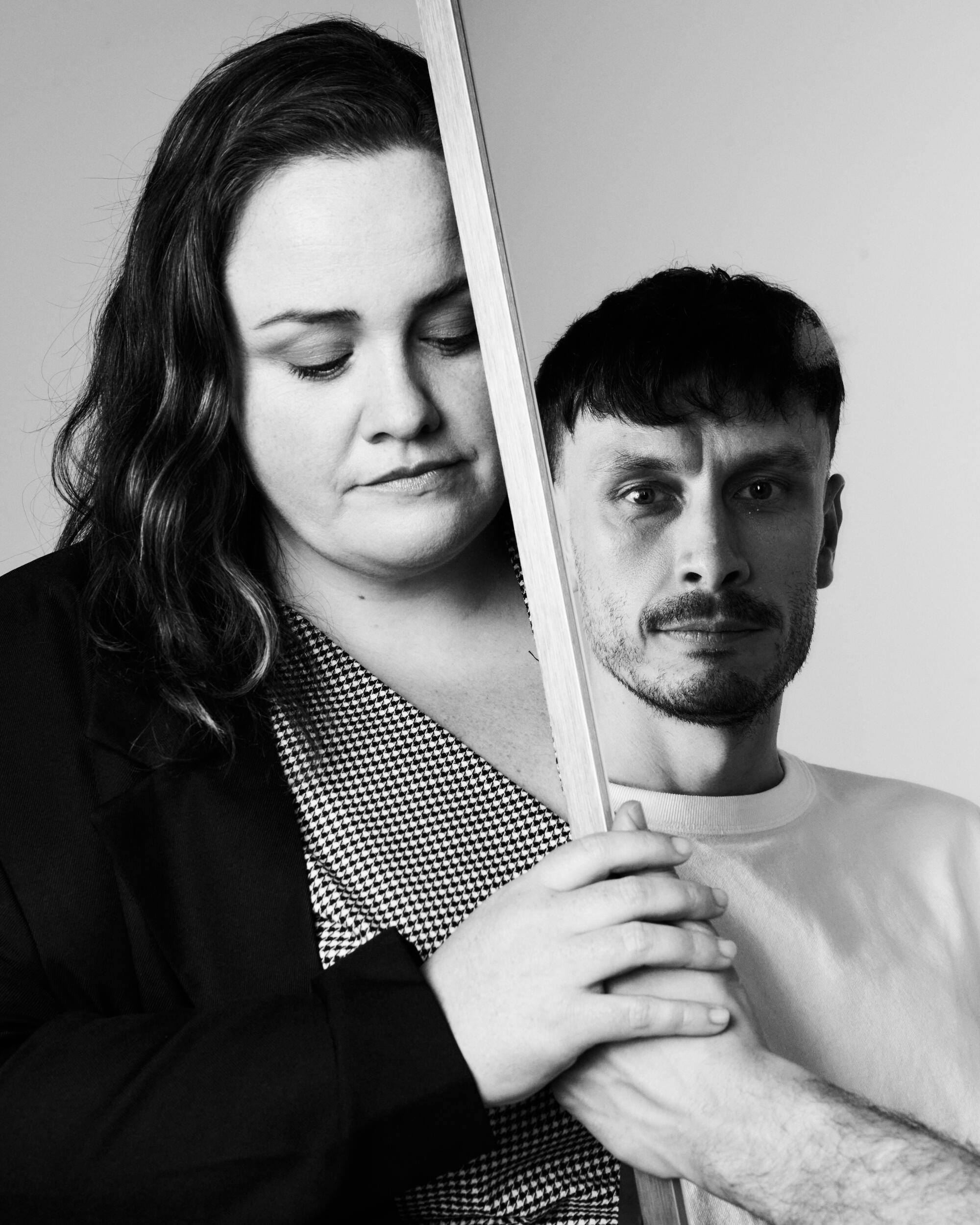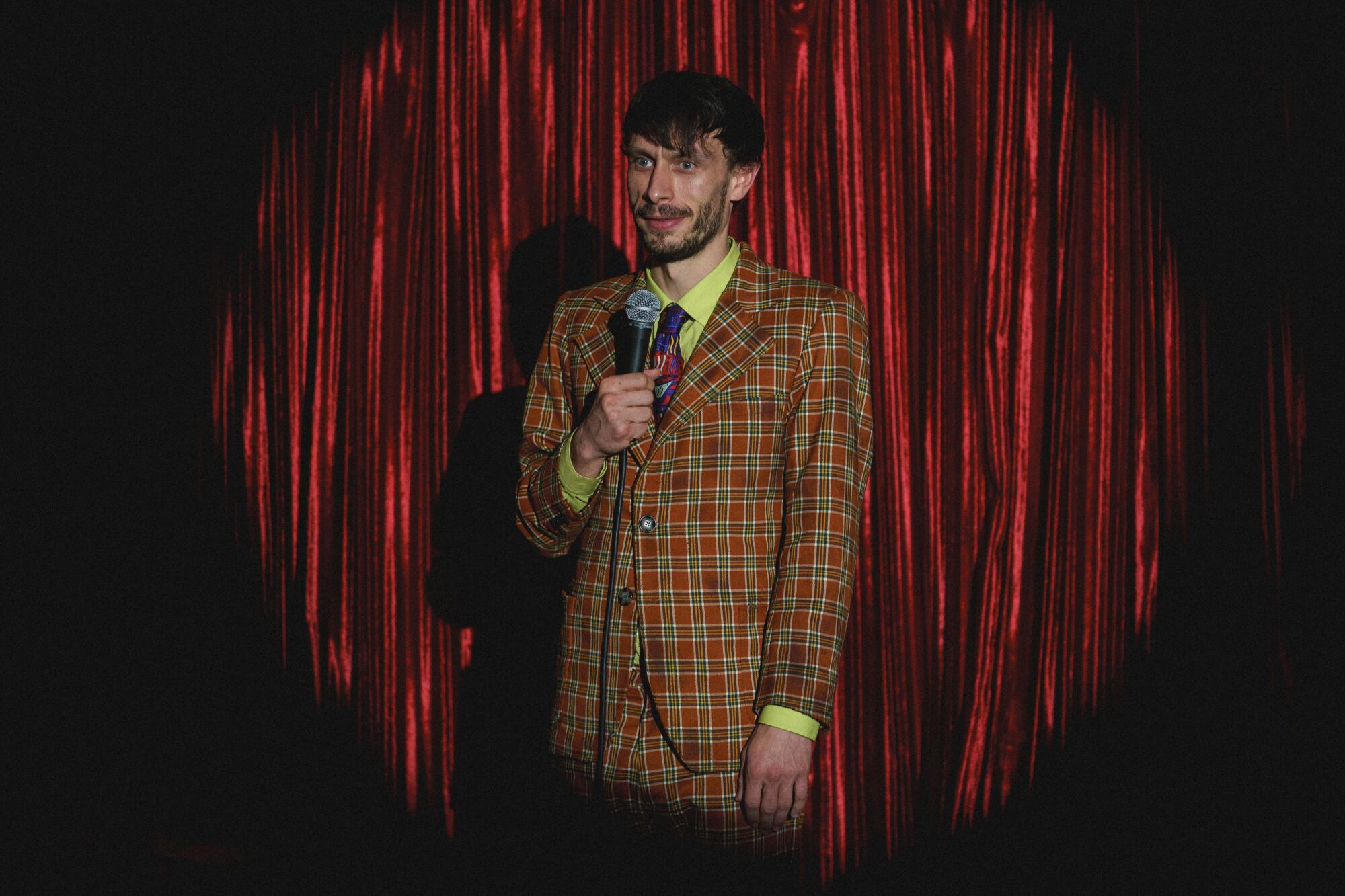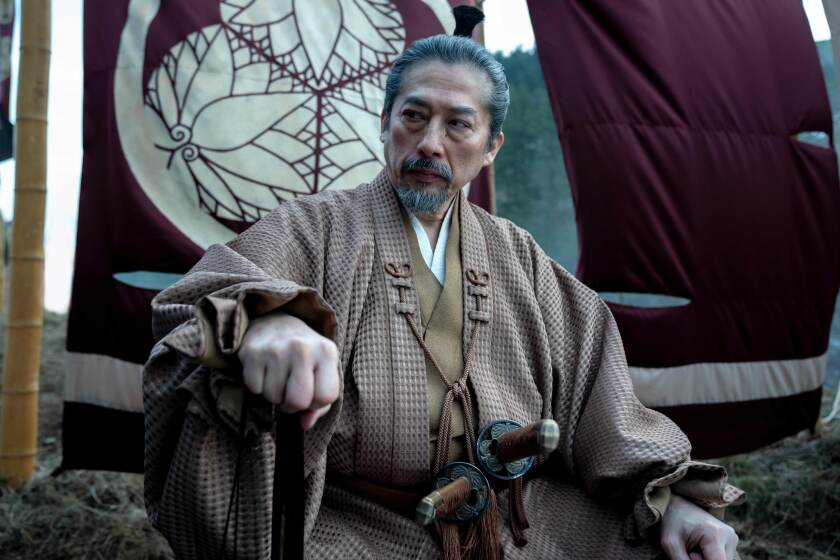
- Share via
A couple of Saturdays after “Baby Reindeer” premiered on Netflix, its star and creator, Richard Gadd, learned that he was the most googled man on planet Earth. Or maybe he topped all searches on Wikipedia. Or it might have been both.
It’s a lot to wrap your head around. What does it mean? Obviously, people want to learn something about you — who you are, what you’ve done, if you’re in a relationship, that kind of thing. That kind of massive, collective curiosity can be flattering. Me? You want to know more about little old me? Or, if you, like Gadd, have created a television show based on your actual experience dealing with a stalker and how your own traumatic past informed that experience, you might be a little freaked out.
On a practical level, having the most-watched series on Netflix for a couple of months running means that when you pop over from your London flat to the pub to have a drink with some mates before the Pogues gig at the Hackney Empire, you literally can’t move because people have swarmed you. Then when Gadd went to the concert, in part a tribute to the band’s late frontman, Shane MacGowan, the same thing happened.
“But I got to meet the Pogues, and that was great,” Gadd tells me. “And they’d all watched the show, which I couldn’t believe, having idolized them my whole life. [Accordion player] James Fearnley said he was on his second go, which is just crazy.”
These days, when it comes to his extraordinary, newfound fame, Gadd is learning to take the good with the bad. Sitting in a Netflix conference room with Jessica Gunning, who plays Martha, the woman who terrorizes Gadd’s alter ego, struggling comedian Donny Dunn, Gadd is relaxed when the conversation focuses on the creation of the seven-part limited series. But there’s also an undercurrent of tension, owing to the fact that Piers Morgan is, while we’re having this conversation, interviewing the woman who claims to be the real-life Martha. (She has since sued Netflix for defamation.)

“Unfortunately, I’m not able to comment on that,” Gadd says, glancing at one of the two Netflix publicists sitting in on the conversation. “Every character in the show, five, six, seven people have been accused of being them. I can’t police the internet. I can certainly go on record to say that I’ll never confirm or deny who they are.
“If I wanted the real-life people to be found, I would have done a documentary. These are my real-life experiences, and I chose to demonstrate them in a fictional world based on truth. All I felt I needed to show the world was the basis of that emotional truth.”
That emotional truth is nothing short of astonishing, the primary reason why so many viewers, like that Pogues band member, have streamed “Baby Reindeer” more than once the last few months.
Gadd’s character, Donny, is miserable; his dreams of becoming a comic have stalled and he’s eking out a living as a bartender. Regrets? More than a few.
When Martha, a middle-age woman verging on tears, sits down at the bar, Donny asks if he can get her something. A cup of tea? She protests. She can’t afford it. “How about I get you a cup of tea on the house?” Martha brightens. She’s thankful. And then she won’t leave him alone.

What begins as a horror story grows deeper and more complex, as Donny’s own behavior becomes increasingly erratic, fueled by a self-loathing and neediness rooted in shame. The first episode begins with Donny entering the police station to report Martha. An officer asks: How long has this been going on? Six months. Why’d it take you so long to report it? The answer, we learn in Episode 4, is devastating.
Gunning’s empathetic portrayal of Martha is vital to the series’ success. Gadd had seen her onstage and on television and thought she had an energy he associated with Martha, “bursting to get out.” She was one of 30 or so women who auditioned, reading two first-episode scenes with Gadd — the cafe “date” between Donny and Martha that goes off the rails and the moment outside the comedy club when Martha tells Donny that she wishes humans had a chin zip that would open all the way to their bellies. “I’d just unzip them and tuck myself away,” she says.
Gunning remembers running lines from the latter scene with a friend before the audition, telling her it was one of her favorites in the show.
“I said, ‘It’s like the sweetest, almost romantic scene,’ and then my friend read it and said, ‘This is terrifying,’” Gunning says. “And it was genuinely the first time of seeing it another way. I was like, ‘Oh, is it scary?’ I thought it was a real compliment in that she found safety in the thought of being tucked inside him for winter.”
That perspective explains why she won the role.

“I was looking for someone who didn’t prioritize villainous characteristics, that the ‘madness’ was a little bit back and the vulnerability came through,” Gadd says. “A lot of people didn’t seem to get that. Only Jess seemed to.”
“Baby Reindeer” began as a 2019 solo stage play with a barstool standing in for Martha. Three years earlier, Gadd’s show “Monkey See, Monkey Do,” which centered on his attempts to process the fear and shame from his own sexual assault, had premiered at the Edinburgh Festival Fringe. Both plays were successful on a small scale, and Gadd figured the limited series would just be this “weird show that’s quite niche in a way” and would occupy a little corner on the Netflix platform. Instead, he spent those initial weeks after its premiere navigating “just a hell of an adjustment.”
“I just feel quite windswept,” Gadd says. “Like, ‘Whoa, this is crazy.’”
In “Baby Reindeer,” Gadd’s character achieves a measure of fame, only to find it hollow and unsatisfying. Has this sudden notoriety left him feeling a bit the same way?
“Ask me in six months,” he replies, quickly adding, “I’m only joking. That’s a joke.” Gadd goes on to talk about all the letters he has received through his agent from people saying the show has encouraged them to break their silence over trauma from their past. He mentions that a male sexual abuse charity based in Manchester, We Are Survivors, reported an 80% increase in calls since “Baby Reindeer” premiered, with more than half of them citing the series as the reason for reaching out.
“I can’t see it as a hollow experience when things like that are happening,” Gadd says.
British actor Jessica Gunning explained how she tackled playing the stalker Martha in “Baby Reindeer” and why she didn’t ask creator Richard Gadd about her real-life counterpart.
He’s also pleased that viewers are discussing — and largely appreciating — the series’ ambiguous ending, which mirrors the moment when Donny gives Martha the cup of tea. Only now, it’s Donny sitting in a bar, distraught, and it’s the bartender taking pity on him, offering a drink on the house. Donny looks up with an expression that can be read many ways. Perhaps he’s remembering that first moment with Martha. Maybe he now possesses a keener understanding of Martha. Or maybe, like Martha, this act of kindness will prompt him to fixate on the Good Samaritan offering it.

“I know what it means to me, but I don’t think I’d ever say it publicly,” Gadd says of the ending. “I think ‘Baby Reindeer’ has a lot to say, but I don’t think it uses a megaphone while it’s saying it. It isn’t bellowing its morality/message down the audience’s throats. I like that it’s open to interpretation. I like that there’s characters people dislike and then you ask the next person and they say they really like those characters.”
“I like that,” he adds, “because that’s life in a way. Everything’s subjective.”
A couple of months later, Gadd and I connect again via Zoom, partly because I’m wondering if he can go to a pub these days without being disturbed. He says there’s been a “bit of a dipping off, a slight coming down” in his public profile, but he’s still not venturing into a Wetherspoons again anytime soon, even if he considers the chain’s “3-pound fry-up” a “rite of passage.”
Sitting in the living room of his London flat, the walls a shrine to the Pogues, adorned with posters and rare albums, along with signed Laurel and Hardy memorabilia, Gadd seems much more relaxed.
Our BuzzMeter panel of veteran TV journalists and pundits offers their take on what will take the awards at the 2024 Emmys on Sept. 15.
“I hate to think of what I was like last time,” he says with a laugh.
He’s focused on writing his next project, currently titled “Lions” (“That’s just a placeholder,” he says), which follows two men, close enough to consider themselves brothers, over the course of four decades from the ’80s to present day. When it was announced that HBO would be co-producing this six-part BBC One show, a press release trumpeted that the series would “try to get to the bottom of the difficult question ... What does it mean to be a man?”
That sounds rather ambitious, I tell Gadd.
“We’ll see what happens,” he answers, laughing. “I really want to do a piece about masculinity and explore it in a way that hasn’t been done before and just try to dig a little deeper into the difficulties around men, the difficulties around emotions and feelings. Just an exploration about the good and bad points about what it means to be a man.”
He’s leaning into the challenge of writing something that’s not based on his own life, as his last few projects have been. As much as I’m appreciating his enthusiasm, it’s hard not to be distracted by his surroundings. Gadd really likes the Pogues. That’s not the half of it, he says. He turns around, grabs something and starts telling me a story about how he once wrote MacGowan a long letter, explaining how he rediscovered the band’s music while he was healing from the trauma of sexual abuse and how lyrics he had listened to all his life now took on this “unbelievable meaning” and became a way for him to cope.
A year later, a package arrived in the mail. It was a rare CD/DVD Pogues box set, signed by MacGowan. The inscription read: “Love Shane.”
“Still, to this day, if there was a house fire, that’s the first thing I’d grab,” Gadd says.

More to Read
From the Oscars to the Emmys.
Get the Envelope newsletter for exclusive awards season coverage, behind-the-scenes stories from the Envelope podcast and columnist Glenn Whipp’s must-read analysis.
You may occasionally receive promotional content from the Los Angeles Times.











